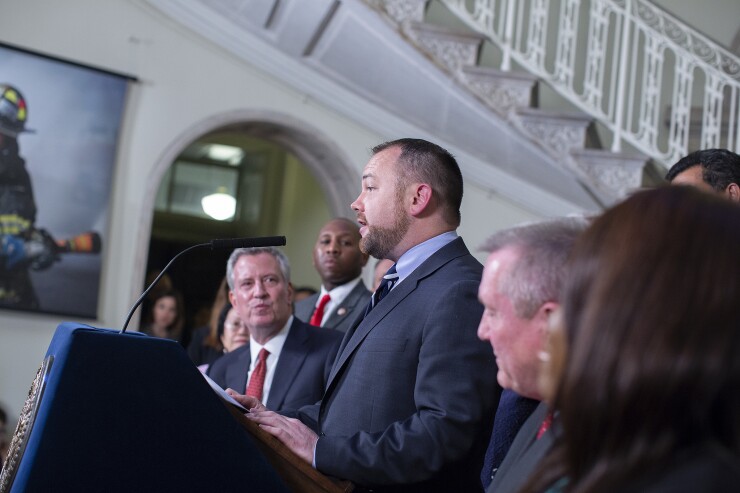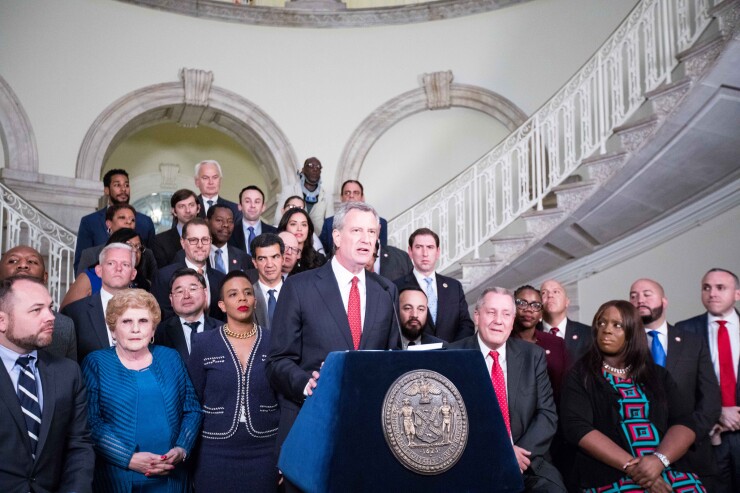New York Mayor Bill de Blasio and the City Council announced a handshake agreement on an $89.2 billion fiscal 2019 budget that boosts reserves, funds a "fair fares" discount for low-income subway riders for one year and provides Fair Student Funding for city schools.
The spending plan announced late Monday is fractionally higher than the

Spending is up roughly 20% since de Blasio took office in January 2015.
"It is profoundly responsible, it is balanced, it is progressive and it is early," de Blasio said in the City Hall rotunda, flanked by council leaders.
It marks the third straight early budget and was the first spending plan for Corey Johnson as council speaker and for Melanie Hartzog as de Blasio's budget chief.
"Melanie came up with some really good answers," council finance Chairman Daniel Dromm said of the
The harmonious announcement followed weeks of back-and-forth between de Blasio's office and the council, whose leadership pushed back on the budget more stridently than did Johnson's predecessor, Melissa Mark-Viverito, notably on fair fares.
"I believe Corey Johnson said 'fair fares' an unfair number of times," said de Blasio, a holdout on city funding of the program until late in the discussions.
The plan accounts for $1.125 billion in the general reserve, a $125 million increase, and $4.35 billion in retiree health benefits trust fund, up $100 million. The capital stabilization reserve designation will remain at $250 million.
This puts budget cushion above 10% of spending. Speaking before the council last month, city Comptroller Scott Stringer favored minimum cushion of 12%.
"We went over a few things," a grinning Johnson said after receiving a much louder applause from council members than did de Blasio. "But at the end of the day, we negotiated in good faith."
The fair-fares program -- $106 million in the budget -- will begin in January, giving the city a chance to promote it within six months.
"The money will go directly to New Yorkers, and not through the MTA," de Blasio said. The city, which is working on eligibility requirements, will administer the program directly and model it after its Human Resource Administration’s cash assistance program and Supplemental Nutrition Assistance Program.
The city did earmark $254 million to in operating and $164 million in capital spending to the Metropolitan Transportation Authority, the state-run agency that operates the city's subways and buses.
De Blasio said he still favors a millionaire's tax, which the state legislature would have to approve, to help provide the MTA with a dedicated funding stream.
He called budget cuts and unfunded mandates from the state's FY19 budget "a curveball we had to deal with here."
State Rep. Nicole Malliotakis, R-Staten Island, who was trounced by de Blasio in last year's mayoral election, called the budget unsustainable.
"Taxpayers will have a hard time rationalizing such lavish spending as rates of homelessness continue to soar, NYCHA housing is unlivable and riddled with corruption, our roads are in disrepair and our transit system is crumbling," she said.

Earlier in the day, de Blasio announced an agreement with the federal government in which the city will add $1 billion in capital spending for the New York City Housing Authority over four years. The city also committed $200 million annually until major problems are fixed.
De Blasio said this is in addition to $3.7 billion in operating and capital spending the city has earmarked for public housing over the past four years. The budget itself calls for $200 million in capital to upgrade heating systems at NYCHA developments and $13 million for short-term heating upgrades for next winter.
The budget also expands the 3-K for All pre-school program, doubling the number of new districts in the next two years from two districts a year to four, bringing the city’s total commitment to more than 14,000 seats in 12 school districts. The total investment in 3-K for All is $201 million by FY22, said the mayor.
Additionally, the plan allocates $150 million over three years in capital investments to increase school accessibility, and accelerates $100 million for supportive housing within the Department of Housing Preservation and Development’s affordable housing budget for de Blasio's Housing New York 2.0 plan, which aims to create and preserve 300,000 affordable homes by 2026.
Moody’s Investors Service rates the city’s general obligation bonds Aa2, while S&P Global Ratings and Fitch Ratings rate them AA. All three assign stable outlooks.





